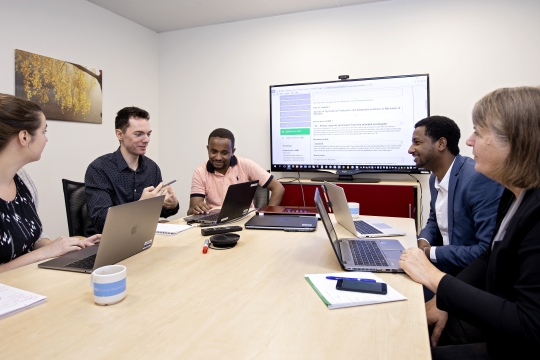Sharing data openly and re-use of data allows the global research community as well as students to replicate studies in a way that can support more robust science. It improves transparency, guards against data fraud, and boosts research scrutiny which can improve the trustworthiness of results. It can also build researchers’ credibility. EfD is developing a data-sharing policy that aims to make the data from across its networks more widely and publicly available, in order to support evidence-based research that supports pro-poor, pro-environment policymaking in the Global South.
What are the challenges?
There are many hurdles to sharing research data. Historically, researchers in particularly social sciences don’t have a culture of sharing information, or they might not understand why sharing is necessary for the common good. Managing data-sharing also needs costly infrastructure and technically-skilled curators, and it takes time. There may also be uncertainty about who owns the data, or privacy concerns relating to data gathered from people who have agreed to participate in studies anonymously.
Recently, there has been a global shift in attitude relating to the sharing of data, where many in the scientific community are becoming increasingly aware of the benefits of making data more widely available. For example, the World Bank and CGIAR, a global research partnership for food security, now subscribe to principles of data sharing.
Increasingly, research funders, academic journals and governments are also calling for the opening up of data into the public domain. In Sweden, where EfD´s headquarters are based at the University of Gothenburg, the Science Council is also moving towards publishing research so that data can be open-access. The Swedish National Data Service (SND), a certified digital repository make data available and is supporting the development of data access units (DAUs) at 27 universities across Sweden. This will allow for local storage and management of data, as well as broad research data support, while linking national and international search portals.
The Centre for Open Science probably best sums up the urgency for sharing data in the interests of supporting sound development policymaking: ‘the challenges of disease, poverty, education, social justice, and the environment are too urgent to waste time on studies lacking rigor, outcomes that are never shared, and results that are not reproducible.’
EfD is addressing the problem
EfD wants to foster a similar open data culture across its developing world network of 15 centres, and all the centres now make data from EfD-funded research projects publicly available. This will allow the network to enhance the quality, availability, and effective use of its research data, to be more transparent in how its funding is used, and to increase the value of data by allowing it to be used elsewhere. Putting data onto an data sharing platform like this can also guard against loss of data. Further, it can reduce duplication of efforts across different research teams, and support greater collaboration. It will also allow EfD’s work to be more globally visible, thus extending the network’s potential impact.
EfD is working with the national SND and the Gothenburg University Library to develop a data access unit (DAU) so that EfD researchers have a credible and well-managed platform across which to make their data available online to everyone with internet access.
Overcoming the technical challenges
EfD embarked on the first phase of this approach when it ran a pilot project in 2018. Following this, all the centres in the network that had received EfD funding in the previous four years began submitting their primary data to be published at the SND’s online platform.
The project has appointed a data manager, who is based at the EfD centre in Ethiopia, to oversee the process of gathering together all of this data from across the network, and submitting it into the system. This is still in the early stages. Data input into the data unit at Gothenburg University is continuing through the first half of 2019, and EfD hopes to have this live and ‘visible to the public’ by the end of the year.
One of EfD’s projects is the Ecosystem Services Accounting for Development (ESAforD) initiative, which involves collecting data from six different countries with the goal of including the value of natural resources in measurements of economic activity. To produce results that can be used globally, ESAforD researchers must merge several datasets from these countries. EfD’s data manager is assisting with this process.
One of the biggest challenges at the moment is researcher attitudes regarding sharing data, perhaps reflecting an ongoing fear that ideas might be stolen by others. Sometimes the process of administering data sharing seems intimidating.
EfD hopes this will change over time as researchers realise the benefits of this new way of handling data and how it can support improved science and greater collaboration.
Potential impact on policy
It is too early for the data project to have any direct and immediate policy impact. However EfD sees huge potential for its collaborative programs to help build its capacity to produce large, valuable datasets that can have impact at an international scale.
One model which EfD recognises and would like to emulate is that of the Political Sciences Department at the University of Gothenburg, which has various research groups that use big data and whose best practices are well regarded. They produce large datasets relating to election studies and governance issues, for instance, and their datasets are in high demand globally. They are regarded as having an enormous impact on the quality and amount of data that is available in their respective research fields globally. This has a measurable impact not only on research, but also on policy-making (see the V-dem website: https://www.v-dem.net/en/).
Relates to SDG:
SDG 9: Industry, innovation, and infrastructure
SDG10: Reduced inequality
SDG 17: Partnerships for the SDGs
Further information:
https://efdinitiative.org/our-work/data
https://efdinitiative.org/news/archive/efd-invests-data-management
